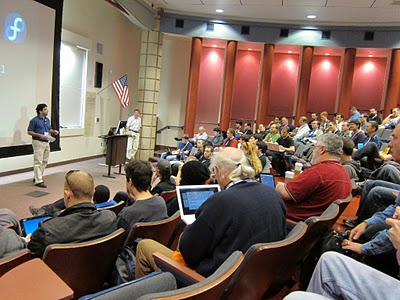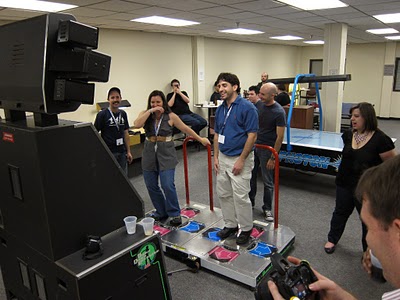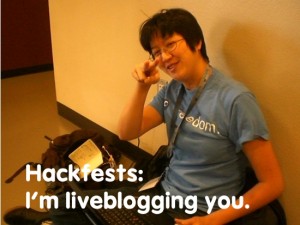A whirlwind of FUDCon sessions
Written for the Teaching Open Source audience, which includes a lot of students and professors who are just getting started as contributors to open source projects.
Although FOSS communities do much of their work remotely, we also recognize that nothing can replace hacking shoulder-to-shoulder with your collaborators - which is why I'm sending my greetings from sunny Arizona right now. The Fedora community is gathering here for its annual North American FUDCon (we run them on other continents as well), a 3-day fest of knowledge-sharing, hacking, and hanging-out, and it's great to see my online friends and colleagues face-to-face - some I haven't seen for months (Sugar on a Stick engineer Peter Robinson from London and Ambassador/Marketer Neville Cross from Nicaragua), and some I've worked with for years but haven't yet met in person (my roommate Tatica Leandro from Caracas, Venezuela and Websites guru Sijis Aviles from Chicago, Illinois).
Photo CC-BY courtesy of Security Spin maintainer Joerg "kital" Simon.
For those of you who may not have gone to a FOSS event before, you'll probably expect technical sessions like the one from the Anaconda (installer) team, but there are things you may not yet associate with free software communities; for instance, cyber-anthropologist Diana Harrelson presented her analysis of the community's social dynamics, and Clint Savage and his camera are parked in a back room for impromptu "shoot your Fedora how-to tutorial" walk-ins.
I'm about to head to an "IP Law for Hackers" session run by Pam Chestek and Richard Fontana, actual lawyers from Red Hat's Legal department in Raleigh; yesterday POSSE co-instructor Sebastian Dziallas (from Germany, now studying in Boston) and I were joined by Python wizard Dave Malcolm (from Red Hat's Boston office) and an incredibly participative audience for a session on RSI prevention, which Nushio (who hails from Mexico and wrangles infrastructure for the Latin American Fedora community) offered to blog notes from - thanks also to Jaroslav Reznik (system-configuration developer from Brno) and others for volunteering their aching fingers, wrists, shoulders, and backs as test-cases for the session. We also had a impromptu lunch chat on Sugar and caught former FPL (Fedora Project Leader) Max Spevack (who also happens to be my boss) on DDR last night at FUDPub.
Thanks again to Joerg for the CC-BY photo-evidence...
So far we've mostly had sessions, which are mini-classes (about an hour long) on any Fedora-related topic people feel like teaching. Aside from the schedule being created on the fly, unconference-style, on the first morning rather than being submitted and approved and posted months before the gathering began, it looks mostly like a "normal conference." Mostly. I mean, most conferences don't have audience members spontaneously standing up mid-session and deciding that they're a presenter too (one session I attended yesterday began with 2 presenters and ended up with 4 at the end). Things like that.
We're about to transition into hackfest mode, which means that people will self-assemble into groups and work on Something They Think Is Cool. A few groups have planned things out beforehand, but I know from past experience that many small spontaneous projects will spring up and announce themselves over the next few hours - something I'm trying to keep track of, because I've decided that my hackfest contribution will be to liveblog them all.
I'm in for a whirlwind education, since hackfest topics run the gamut from a secondary logo trademark policy (yep, the lawyers are running a hackfest of their own!) to internationalization/translation test cases to etherpad (collaborative text-editing) to mediawiki features to coming up with collaborative study strategies for the Fedora community members who are thinking about taking the RHCE exam together. I'm particularly psyched that the Design Team finally has enough contributors in one place to do a hackfest making artwork for the next release - they're an especially distributed team and have a hard time getting together to sketch in person. In fact, I think there may be only one country in the world (USA) with more than one regular Design contributor. I think the USA might have... perhaps... 3.
A huge thank-you to Robyn Bergeron and her crew of local and not-quite-so-local FUDCon volunteers for making this all happen. For those of you watching remotely, or who are curious what this "FUDCon" thing is all about, we're on IRC (Freenode) in #fedora-fudcon and happy to take questions if you pipe up and ask. A good portion of this year's FUDCon attendees are first-timers and/or new to Fedora, so if you're looking for a way to get started with the community, consider coming to the next FUDCon in your area, or starting your own.
Whoops. I think I spent too long writing this post and missed the "IP law for hackers" session. Time to run in and see what Pam and Richard wrote on the whiteboard, and hope someone took notes!


